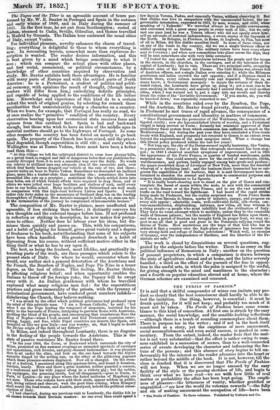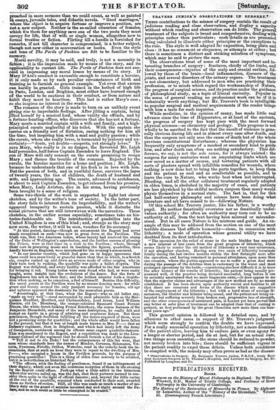THE PERILS OF FASHION, IT is said that a skilful
compounder of wines can imitate any pro- duct so closely that the best connoisseur shall hardly be able to de- tect the imitation. One thing, however, is essential; it must be drunk quickly, for it will not keep ; and probably too much of it must not be taken. The Perils of Fashion bears some resem- blance to this kind of concoction. At first one is struck by the easy manner, the social knowledge, and the sensible-looking reflection* —although there is a touch of sounding commonplace about them. There is purpose too in the writer ; and if not in the book itself considered as a story, yet the emptiness of mere amusement, social accomplishments and even social success, is marked in com- mentary. From the outset, indeed, the reader feels that the mat- ter is not very substantial—that the effect is rather owing to man- ners exhibited in a succession of scenes, than to a well-connected series of events developing the character and influencing the for- tune of the persons; and this absence of story begins to tell un- favourably for the interest as the reader advances into the heart or rather beyond the middle of the book. It is not, however, till the close is reached that it is discovered that The Perils of Fashion will not keep. When we are no longer amused by the easy facility of the style or the passing sketches of life, and begin to think over what we have read—we see with how little of real matter or probability the affair has been kept going. The empti- ness of pleasure—the bitterness of vanity, whether gratified or ungratified—" see how the world its veterans rewards' —the folly and sin of making amusement the occupation of life—have been
• The Perils of Fashion. In three volumes. Published by Colburn and Co. preached in more sermons than we could count, as well as painted m essays, juvenile tales, and didactic novels. " Good marriages," where the object is to acquire fortune or improve a position, are not a new subject. Neither is the so-called education of females, which fits them for anything save one of the two posts they must occupy for life, that of wife or single woman, altogether new to formal treatise or fiction. Flirting till a handle is furnished for remarks, if not till character is compromised, is a better subject, though not new either in conversation or books. Even the style and tone of The Perils of Fashion are felt to be familiar to the memory.
Moral novelty, it may be said, and truly, is not a necessity in fiction ; it is the impression made by means of the story, and its applicability to current life. The Perils of Fashion does not suc- ceed in impressing any moral lesson by means of its story. If Mary D'Arc's conduct is excusable enough to constitute a heroine, it is only made so by such peculiar circumstances of birth and training as to furnish no general example. Yet even that excuse can hardly be granted. Girls trained in the hotbed of high life in Paris, London, and Brighton, must either have learned enough of the world to be cautious in their conduct, or from nature and habit they must be heartless. This last is rather Mary's case ; so she inspires no interest in the reader. The romance of the story is made to turn on an unlikely event giving rise to improbable feelings. After jilting a captain, being anted herself by a musical lord, whose vanity she offends, and by a fortune-hunting officer, who discovers that she has not a fortune, Mary meets a married captain with a wife and family, and a high- principled curate neglectful of his toilet. With the captain she carries on a friendly sort of flirtation, oaring nothing for him all the time, but inspiring him with a mad and guilty passion; while the curate, whom she really loves, is tormented by jealousy and un- certainty—" cleats, yet doubts—suspects,yet strongly loves." To save Mary, who really is in no danger, the Reverend Mr. Leigh half persuades, half forces Captain Essenden to leave England. The son of Mars will only consent on the curate promising to resign Mary ; and thence the trouble of the romance. Rejected by the curate, the heroine marries for a home and position ; Mr. Leigh, because he understands that one of his flock is in love with him. But the passion of both, and in youthful furor, survives the lapse of twenty years, the ties of children, the death of husband and wife, and approaching age. The curate, advanced to archdeacon, is about to seek Captain Essenden, to get released from his promise, when Mary, Lady Aviston, dies in his arms, having previously been brought to a sense of religion.
Some two-thirds of the work is supported by light but clever sketches, and by the writer's tone of society. In the latter part, the story fails to interest from its improbability, and the writer's apparent incapacity to sustain passion, while it disturbs the social pictures that are still interwoven with the narrative. These sketches, in the earlier scenes especially, sometimes take an his- torioo-fashionable air. The introduction of quadrilles into the United Kingdom is one of this kind ; and, strange as the story may now seem, the writer, it will be seen, vouches for its accuracy.
"At this period, dancing—though an amusement the Regent had never much recognized as such—was now in great force at the Pavilion. The truth was, that two American ladies, whose beauty had received the stamp of the Duke of Wellington's approbation, and the further success of pleasing the Prince, were at that time on a visit to the Pavilion ; where, through their care m procuring music and in teaching the figures, quadrilles, then hardly known in England, were introduced for the evening's amusement. " In our insular country, which had gone on in happy ignorance that there could be a more lively or graceful dance than that in which, to a Scotch air, couples rushed up and down an avenue made of other couples, who in their turn took to rushing, the quadrille was quite a ballet cr opera. The Regent was delighted and every facility was afforded to the fair Americans for bringing it out. Young ladies were soon found who had, or were easily taught, some insight into the evolutions of the dance. But the forte of Englishmen lies not in their feet ; and the boldest islander feels a trepida- eon when making, as he conceives, a fool of himself. Besides this difficulty, the usual guests at the Pavilion were by no means dancing men : for while grace and beauty seemed the only passport necessary for females, old age and ugliness appeared the desiderata for the masculine guests. "Accordingly, at that time, when the Regent—who as old ladies say, 'made up very well'—stood surrounded by such admirable foils as the Mar- qUisses Headfort, Hertford, and Cholmondeley, Lord Arran, Lord William Gordon, old Dr. Blomberg, the orange-coloured Spaniard Count Fenian linnet, the white ferret-looking Prince Esterbazy, the coarse features of Sir Benjamin Bloomfield, and many of the same description, he really felt and looked an Apollo in a group of admiring and courteous Satyrs. But these gentlemen, though doubtless fulfilling all the duties required of them, were not a promising corps for quadrilles ; and the whole affair would have fallen to the ground, but that it was at length made known to Mrs. P— that an Infantry regiment, then in Brighton, and which had lately left the Army of Occupation, numbered among its officers some expert quadrille-dancers. This was mentioned to the Regent, and a requisition was made to the Lieu- tenant-Colonel of the regiment that he should furnish a list of his dancers. " Tell it not to the Duke ! but the consequences of this list were, that men whose standards bore the names of Minden, Corunna, Salamanca, Fit. toria, Pyrenees, Nivelle, Orthee, Waterloo, read in the orderly-book the in- struotiona, that at such an hour they were to repair to the dwelling of Mrs. P—, who occupied a house in the Pavilion grounds, for the purpose of practising quadrilles ! This is a thing of olden time scarcely to be credited, but it is nevertheless an historical fact.
"The officers, with the feeling of gentlemen, found it an infringement of their dignity, which not even the courteous reception of them in the evening by the Regent could efface. Perhaps what a little added to the bitterness athMh this service called up, was the fact, that their partners seemed to con- sider them quite in the light of official dancers; and, beyond the little curtsy at the end of the quadrille, repeated when conducted to their seat, awarded them no further attention. Still, all this was made as much a matter of mi- litary duty as the guard of sentries mounted day and night around the Pa- lace, and as such could as little be attempted to be evaded."



























 Previous page
Previous page